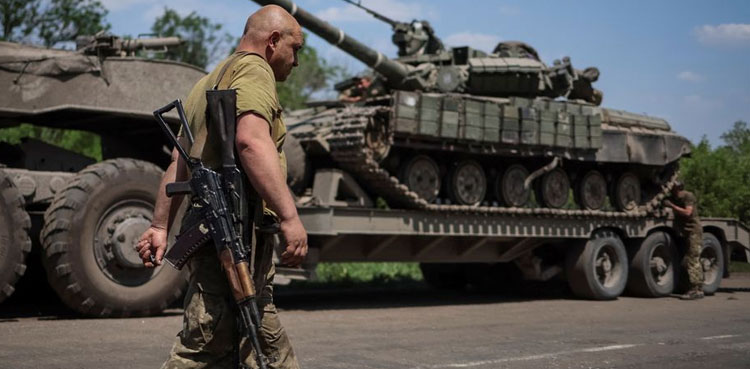Signalling that the Kremlin was in no mood for compromise, President Vladimir Putin said sanctions against Russia for the invasion it launched in February risked causing “catastrophic” energy price rises.
His top diplomat, Sergei Lavrov, clashed with his Western counterparts at a G20 meeting in Indonesia, where they urged Russia to allow Ukraine to ship its blockaded grain out to an increasingly hungry world.
Russia’s envoy to Britain, meanwhile, offered little prospect of a pullback from parts of Ukraine under Russian control.
Ambassador Andrei Kelin told Reuters that Russian troops would capture the rest of Donbas in eastern Ukraine and were unlikely to withdraw from land across the southern coast.
Ukraine would eventually have to strike a peace deal or “continue slipping down this hill” to ruin, he said.
On the front lines in the east, Ukrainian officials reported heavy Russian shelling of towns and villages as Russian forces attacked from several directions.
“Russians are firing along the entire front line,” the governor of the Luhansk region, Serhiy Gaidai, said on the Telegram message system.
“The enemy is trying to advance from the settlements of the Luhansk region to the first villages of Donetsk region.”
Russia says it wants to wrest control of the entire Donbas, the eastern industrial heartland made up of Luhansk and Donetsk provinces, on behalf of Moscow-backed separatists in two self-proclaimed people’s republics.
After taking the city of Lysychansk last Sunday and effectively cementing control of Luhansk, Russia has made clear it is planning to capture parts of neighbouring region.
Gaidai said Russian forces had not paused after their recent advances in the east. “They attack and bombard our lands with the same intensity as before.”
The Russians have also seized a big chunk of territory across Ukraine’s south.
In the Russian-occupied parts of the Kherson and Zaporizhzhia regions in the south, Ukraine’s deputy prime minister urged residents to evacuate before Ukrainian forces launch a counter-offensive.
“Please leave – our army will begin retaking these areas. Our determination is rock solid,” Iryna Vereshchuk was quoted as saying by Ukrainian media.
Ukrainian media cited military sources as saying 194 Russian soldiers had been “eliminated” in the south over the previous 24 hours.
Reuters could not independently verify battlefield accounts.

‘PROLONG CONFLICT’
Mykhailo Podolyak, the Ukrainian chief negotiator in stalled talks with Moscow, said earlier that Russia’s military had been forced to take an operational pause due to losses and to resupply.
“It is clear that they have to redeploy things, bring forward new troops and weaponry, and this is very good. A certain turning point is beginning to take shape because we are proving we are going to attack storage facilities and command centres,” Podolyak told Ukraine’s 24 Channel television.
Britain’s Ministry of Defence said in a regular bulletin Russia was moving reserve forces from across the country and assembling them near Ukraine.
Ambassador Kelin’s remarks gave an insight into Russia’s potential endgame – a forced partition that would leave its former Soviet neighbour shorn of more than a fifth of its post-Soviet territory.
Ukrainian officials said they needed more high-grade Western weapons to shore up defences.
U.S. President Joe Biden signed a new weapons package worth up to $400 million for Ukraine on Friday, including four additional high mobility artillery rocket systems (HIMARS) and more ammunition.
Zelenskiy on Twitter thanked Biden for the HIMARS and shells, which he said were priority needs.
Commenting on the supply of weapons, the Russian embassy in Washington said the United States wanted to “prolong the conflict at all costs” and compensate for Ukrainian military losses.
The United States started providing the precision rocket weapon system to Ukraine last month after assurances it would not use them to hit targets in Russia. Kyiv has attributed battlefield successes to the HIMARS.
At the meeting of G20 foreign ministers, U.S. Secretary of State Antony Blinken led efforts to press Russia. He was meeting China’s foreign minister, Wang Yi, on Saturday and was expected to repeat warnings to Beijing not to support Russia’s war.
On Friday, Lavrov walked out of a meeting, denouncing the West for “frenzied criticism”.
High on the list of G20 concerns is getting grain shipments from Ukraine out through ports blocked by Russia’s presence in the Black Sea and mines. Ukraine is a major exporter, and aid agencies warn that many developing countries face food shortages if supplies fail to reach them.
Blinken urged Russia to let Ukrainian grain out, a Western official said.
Since Russia started in February what it calls a special operation to demilitarize Ukraine, cities have been bombed to rubble, thousands have been killed, and millions displaced.
Ukraine and its Western allies say Russia is engaged in an unprovoked land grab.
from International News Today - Breaking News, US News, World News https://ift.tt/TgZqPaR
via IFTTT